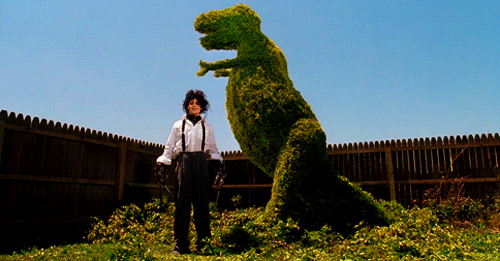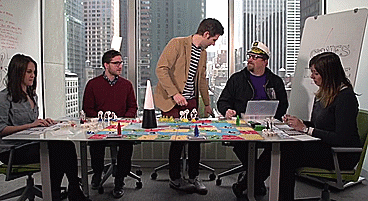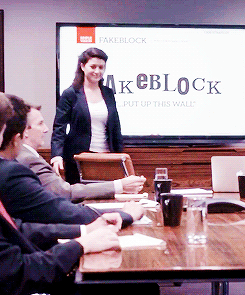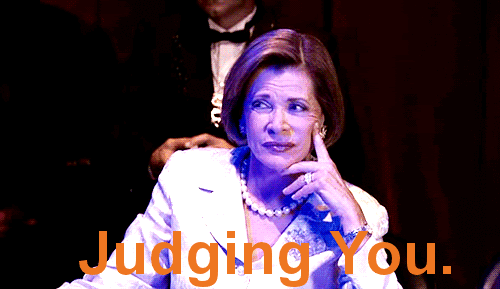The "Why Hire Me" presentation isn't common. But I recently helped a friend with this, and it got me thinking about the process and what some useful strategies and tactics are.
1. Give them a well-rounded view of you as a person—not just professional accomplishments, but your hobbies and interests.

Our friend, for example, had a slide listing his interests along with a photo that showed his travel and volunteer work. He told them (hobbies changed to something slightly different) that he's an amateur kitesurfer, an avid BMXer, and a light-sport aircraft pilot.
(Or perhaps you've created your own intricate tabletop game.)

I had no idea my friend was an LSA pilot (WHAT OTHER SECRETS DOES HE HAVE), and I silently updated my mental files, wondering when, exactly, he ever had time to do that.
2. Provide examples of how your experience matches up with the role. If you've already received feedback or can infer what their main objections may be to hiring you, you might want to pick examples that reinforce why you're capable of doing the job.
Do your research beforehand, and get crafty. Our friend looked through all of this company's job postings to get a feel for what tools/software they used. Job postings can be a valuable source of information on how a company operates.
3. Tell them WHY you're excited about the role. And make the presentation interactive—ask your audience simple, relevant questions to increase engagement.
4. Give them some ideas about what you would do if you had the job—but don't give away the store. You've probably seen this on Silicon Valley: a company brings someone in, asks them to solve a hairy problem on a whiteboard, and never talks to them again.
It's not uncommon for interviewers to describe a problem and ask how you would approach it. If it's directly connected to what you'd be doing for them, try to give them an overview of what you'd do, but not so many details that they can hire a more junior person and run with your plan -- or take credit for it themselves and get promoted off of it. Because they will.
5. Practice in front of an audience—friends, family, confused people at Trader Joe's, etc. Practice the situation from beginning to end, and with a lot of starting and stopping to simulate being asked questions. Watch for phrases you tend to overuse.
6. Get there early, and don't be afraid to reconfigure the room if you need to. You don't want to be stuck in an uncomfortable chair or have a bright window in front of you.
Don't stand behind a podium the whole time, if that's the layout. Unless the situation clearly calls for sitting, you'll probably want to stand while you present.

7. Try to get the recruiter or hiring manager to give you any insights they have into what the company wants you to cover. It's possible some companies will give you a list; others may just say "do what feels right."
8. Be sure to come well-rested, and eat a high-protein meal beforehand. There's no way to tell if you'll have an opportunity to eat during interview day. Bring food and water with you just in case.
9. Try to get a list of the people who will be attending ahead of time. This will help you decide whether it's going to be a high-level, strategic conversation, or if it's going to be a technical conversation focused on details.
Will the people attending be on a peer level, a higher level, a trainee level? All three? This will help you prepare questions, adjust your focus, and know how much information to provide -- as well as what tools you use with your presentation.
10. Ideally, leave at least 15 minutes at the end for Q&A—though you could check with the recruiter if they want to ask questions throughout or save them for later. Prepare some general questions and a selection of questions targeted toward specific people.
11. If you're presenting to a larger group, and tend to be sensitive to people's expressions and body language, it helps to expect that some of them will seem closed off, defensive, unresponsive, or even hostile, even if that's actually not how they feel at all. If you go in expecting that, and know it doesn't necessarily reflect how much they do or don't like you, it won't throw you as much.

12. If the interviewer asks a question that you don't quite know how to answer, ask them to please clarify their question ("The Spelling Bee Gambit"). This will give you a little more time, and you'll probably receive some additional information.
If you're unsure about the content that'll be covered, add some backup slides at the end of of your presentation just in case you get questions about more detailed topics.
Say you're applying for a finance job, and part of the work is doing corporate valuations. You may have an extra slide with a spreadsheet you've made so you can walk them through the formulas.
Now there's just the waiting...and the waiting...

Like what you just read? Sign up for my newsletter for more tips and techniques for being creative and productive.
gifs by giphy!
Sources:
5 Steps to Acing Your Interview Presentation